Google Searches Puts Artificial Intelligence at the Center

Google is moving slowly and carefully to integrate artificial intelligence into its search engine. Although the company may be too slow for some, a completely new search experience is approaching.
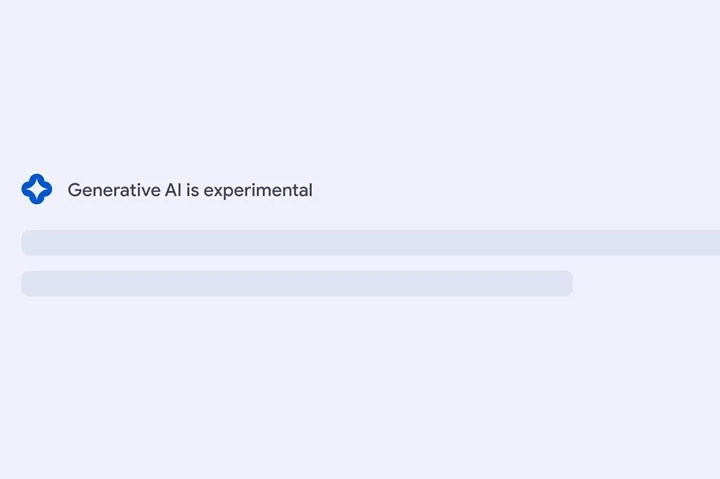
I can say without a doubt that the future of Google Search is definitely artificial intelligence. In the announcements made at the Google I/O 2023 conference, the software giant shared the future of the search engine, and this future is not far away.
Synonymous with web search, the company doesn’t fully agree with chatbots (though it’s building one called Bard) and isn’t redesigning its homepage to look more like ChatGPT or the new Bing-style messaging system. Instead, Google is putting artificial intelligence at the center of current search results, the most valuable real estate on the internet.
Demos Shown Are Very Impressive
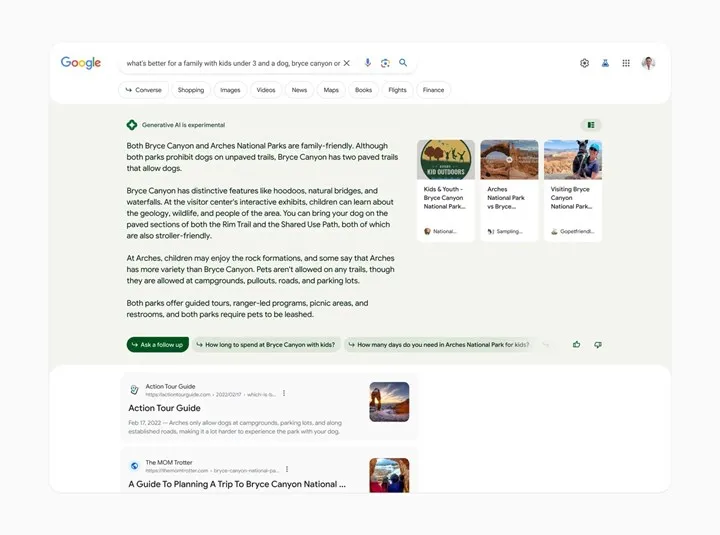
Liz Reid, Google’s Vice President of Search, also gave a small example to illustrate this. “Why is sourdough bread still so popular?” Reid asked in the search box. type and press enter. Google’s normal search results load almost instantly. Above them, a rectangular orange segment flashes and displays the phrase “Generative AI is experimental.” A few seconds later, the glowing part is replaced by an AI-generated summary: a few paragraphs describing how sourdough tastes good, the benefits of its prebiotic abilities, and more. There are links to three other sites right next to this brief summary.
AI Snapshot
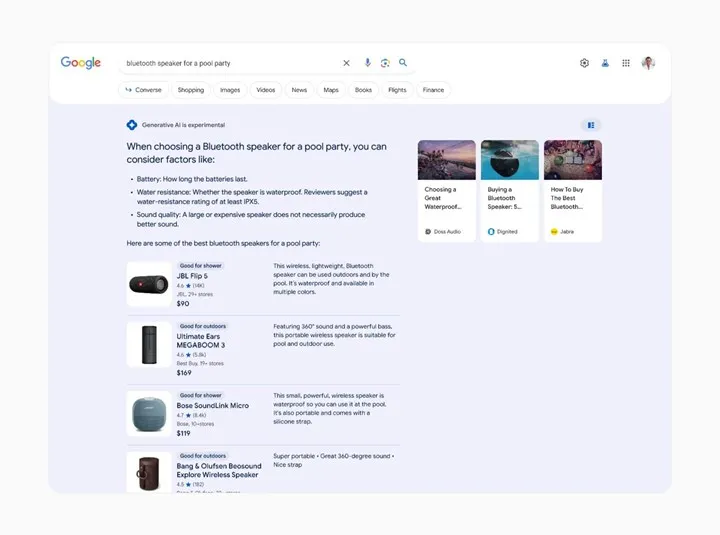
This part, called the “AI snapshot”, can be detailed by clicking the menu icon in the upper right, and more links are included. In another example, Reid is searching for the best Bluetooth speakers for the beach. Again, standard search results appear immediately and artificial intelligence results are produced after a few seconds. This time, there is a short summary (such as battery life, water resistance, sound quality) at the top detailing what you should pay attention to in such a speaker. On the right are links to three buying guides, and below are shopping links to half a dozen good options, each with an AI-generated summary next to it.
PaLM2 and SGE
This is the new look of Google’s search results page. Artificial intelligence is priority, colorful and not what you are used to. We’re actually seeing a combination of some of Google’s most advanced Large Language Model (LLM) work to date, including the new general-purpose model, called PaLM2, and the Multitasking Unified Model (MuM), which Google uses to understand multiple media types. I can say that the demos shown are extremely impressive. And the search experience on mobile devices is changing radically, especially given that the “artificial intelligence snapshot” often takes up the entire first page of your search results.
There Are Some Warnings
To access these AI snapshots, you will need to select a new feature called Search Generative Experience (SGE for short), which is part of a new feature called Search Labs. Search Labs is currently only available in English. You can visit the link here to sign up. Not all searches will trigger an AI response – the AI only pops up when Google’s algorithms think it’s more useful than standard results. On sensitive issues such as health and finance, there will be no artificial intelligence touch for now. The new Google search screen doesn’t kill the standard blue-colored sitelinks, but pushes them down quite a bit. I can say that when you search for the best movies of 2022, the best water purifiers, the artificial intelligence snapshot will occupy the top of the screen.
In a nutshell, the artificial intelligence that Google has integrated into search adds another layer of input, helping you ask better, richer questions. And it adds another layer of output designed to both answer your questions and guide you to new ones.
This box at the top of the search results might seem like a minor move by Google compared to Microsoft’s AI-driven Bing redesign or all of ChatGPT’s innovation. But SGE is the first step in a complete rethink of how billions of people find information on the internet and how Google makes money.
What Will Change in Our Lives?
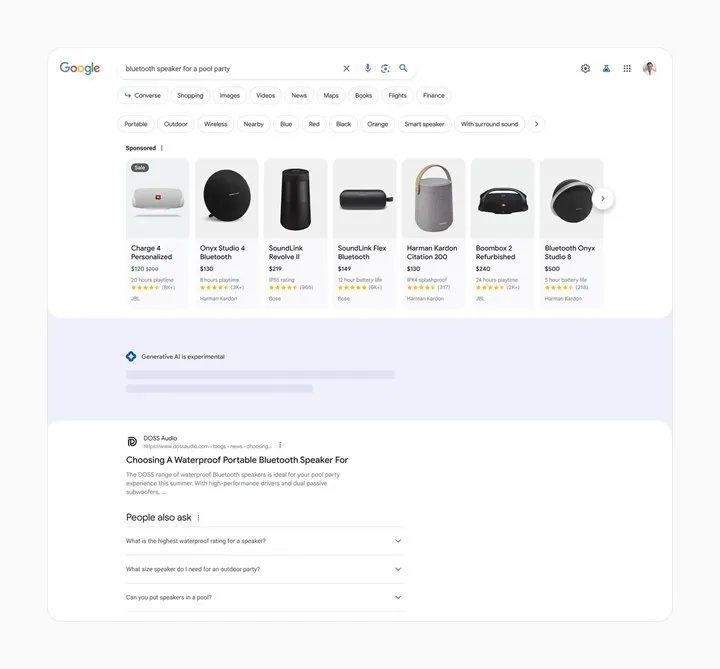
If you go to Google and type “Facebook” or search for “How many kilometers between Istanbul and Rize”, there will be no change in your life and in the way Google responds to them. But “Where should I go next week in Paris?” or “Which restaurant is the best in Rize?” Everything will change here when you have to ask questions like. These are difficult questions to answer because they are not really just one question. What is your budget? What days are all museums open in Paris? How long would you like to wait? Do you have children with you? It goes on like this.
Prabhakar Raghavan, Senior Vice President of Search at Google, says it’s difficult to give “correct” answers to these queries. So yes, the information of these queries is in a corner of the internet and Google, but the important thing is “accuracy”. “People want to say ‘plan me a seven-day vacation,’ and they believe that if the language model is outputting it must be true,” says Raghavan. However, it seems that Google isn’t really after “correctness”, it just wants to give more ideas.
Raghavan and Reid also underline that SGE still hasn’t done these purely creative actions very well. Currently, with the new tool it will be much more convenient to synthesize all the call data behind questions like “which speaker should I buy to take to the pool”. He’ll also do well on the “what were the best movies of 2022” question, as he’s got some Rotten Tomatoes-style objective data he can use, along with a lot of rankings and blog posts on the topic on the internet. AI seems to be making Google a better information machine, even if it’s not quite ready to be your travel agent.
Don’t Think You’re Getting Rid of Ads
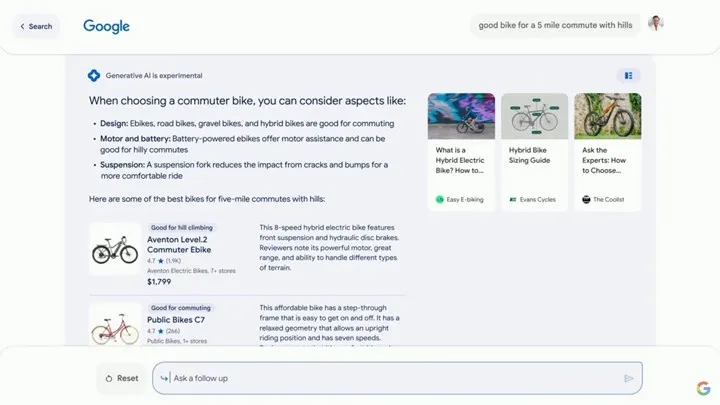
Google is still experimenting with how to add ads to AI snapshots, but the ads are sure to come. Google will need to monetize AI for these to work. If the money is not to be earned, these are meaningless anyway.
Google Bot
Google aims to use a completely objective model in the artificial intelligence view part. So subjective information is not something to be desired. Google’s search AI is not supposed to be clueless. He should not use the word “I” when answering questions. Unlike Bing’s multi-person chaos or ChatGPT’s friendly assistant or even Bard’s all that “cheerful middle school teacher” vibe, Google’s search AI isn’t trying to sound human or friendly. “You expect the librarian to really understand you and help you with something you’re looking for, not to be your friend,” says Reid. That’s what Google is aiming for.
Everything will change
Compared to the flashy launch of the new Bing or the dizzying pace of development of ChatGPT, SGE remains extremely conservative. It’s an optional, impersonal tool that collates and summarizes your search results. In other words, Google Bard is not the future of search. But artificial intelligence is. Over time, SGE will start leaving the labs to enter search results for billions of users, confusing the generated information with links from the web. It will change Google’s business and possibly subvert some of the way the web works. If Google gets it right, it will trade the 10 blue links for all the information on the internet, all in one place.






